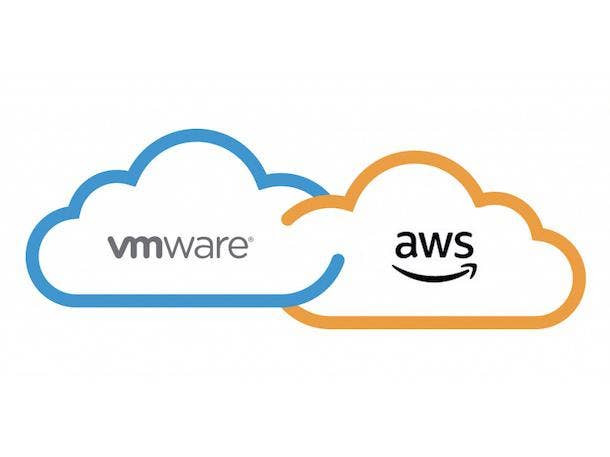VMware On AWS Upgrades Empower Partners To Attack The Midmarket
Partners will be able to provision smaller deployments, and instances with larger storage capacity, both of which bring down the barrier to entry that limited sales of the hybrid cloud solution to smaller customers.

VMware and Amazon Web Services upgraded their joint offering Wednesday with capabilities designed to lower the barrier to entry that had made it difficult for partners to bring the hybrid cloud solution to a wider market.
Among the notable changes to VMware Cloud on AWS is a reduction in the minimum size of a deployment, and availability of a storage-optimized AWS EC2 instance—two changes partners say will make it easier for them to sell the service to smaller customers.
“What that means to our partners and customers, they’ll be able to offer an entry price 33 percent cheaper,” Ivan Oprencak, VMware’s director of product marketing, told CRN. “That’s especially relevant to midmarket and commercial sectors.”
[Related: 10 Keys To Successful VMware Cloud On AWS Migrations]
The changes, which also include the ability to deploy and manage VMware Cloud on AWS instances with vCloud Director, were directly motivated by input from partners, Oprencak said.
“The set of new capabilities are going to help our channel partners get net new customers onto the platform and help them grow their existing customer footprints,” he said.
Mark Vaughn, engineering director for integrated solutions at Presidio, a New York-based cloud solutions powerhouse, sees the upgraded capabilities as essential to maintaining what has been impressive market momentum for the hybrid cloud service by appealing to smaller organizations.
The relaxed minimum requirement for a production deployment “really brings it down more from that enterprise space to the commercial space,” Vaughn told CRN.
The change comes at a good time, Vaughn said--as Presidio has had more conversations of late with smaller organizations, as well as state and local governments, looking to use VMware Cloud on AWS for narrower use cases, like disaster recovery or one-off projects.
Upon its launch three years ago, VMware Cloud on AWS required at least four nodes to be provisioned in production clusters. The configuration requirement was later reduced to three nodes.
But for many businesses, “three nodes is overkill,” Andre Wu, vice president of solutions and services at Cincinnati-based RoundTower, told CRN.
“Being able to drive down the entry point into the mid-tier space is really important to us,” Wu said.
Jon Palmer, solutions engineering manager at SHI International, a large VMware Cloud on AWS partner based in Somerset, New Jersey, sees the change opening his company’s practice to remote offices that hope to rid themselves of small data centers and eliminate capital expenditures.
“Those capabilities are going to reduce the price point for some customers trying to get started by reducing the number of hosts,” Palmer said.
Partners also applauded VMware for making the hybrid service compatible with Amazon’s I3en instances that are optimized to deliver high SSD storage capacity for databases, distributed file systems and data warehousing.
The i3en instances will enable VMware Cloud on AWS partners to address customers with storage-demanding workloads, as they offer more than three times the capacity of the currently available option, and can cut in half the cost per terabyte, Rima Olinger, AWS' global alliance lead of VMware Cloud on AWS, told CRN.
“Our partners are going to offer a more attractively priced instance for their customers that have storage demands,” Olinger said.
The i3en introduction solves what has been “one of the technical challenges we’ve seen with VMC,” said Wu.
Without those instances in their arsenal, partners like RoundTower have had to either integrate a third-party storage solution, or “over-inflate how many nodes you have to meet the storage requirement,” Wu said. “And then it gets expensive.”
That limited the market, Wu said. “To be price competitive, storage is big.”
For larger companies managing terabytes, even petabytes of data, the bill “was too expensive to pay for all those hosts when you needed that storage capacity,” said SHI’s Palmer.
“The i3en is going to be big for reducing the costs for those larger customers,” he added.
VMware’s Oprencak also expects the coming availability of VMware Cloud Director for VMware Cloud on AWS to be a boon for MSPs, as it allows them to use multi-tenancy features to share capacity across their customers, which can bring the entry price even lower.
VMware Cloud Director “gives more freedom to MSPs to decide how they want to structure their offerings,” Oprencak said.